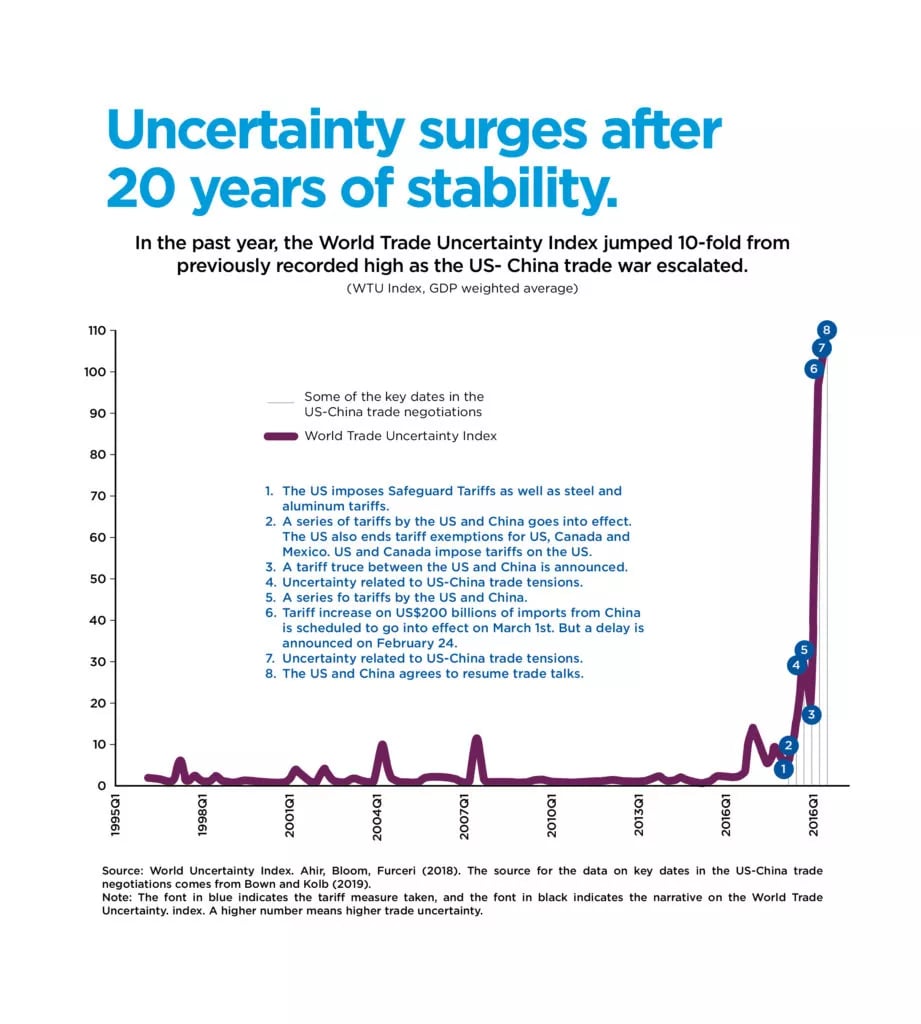Uncertainty at a Cost. It´s a fact. The uncertainty in the global trade market has already cost more than the actual tariffs themselves, and there is no real relief in sight. According to the US National Bureau of Economic Research, the total net effect of tariffs over 2018 increased the price of US manufacturing by 1% – comparative to the annual average rate of producer inflation from 1990-2019 – much of which will inevitably make it´s way to the US consumer (*1).
In total the US has slapped $550 billion dollars worth of tariffs on Chinese goods and in ruturn China has tariffed $185 billion dollars worth of goods coming from the United states. (*4) The US Federal Reserve estimates that through early 2020 the uncertainty over trade policy is likely to reduce the US economic output by more than 1%.
So what does uncertainty cost the global economy?
Between delays in investment plans, consumption and inventories and prices, some analysts estimate that U.S.-led trade uncertainty has hampered global trade growth by -.5pp (*2). The constant escalation of trade policy reform and the inability to keep up with a quantification of costs and impacts continues to increase the uncertainty index, devised by the International Monetary Fund to keep track of this measure.
Sources:
(*1) https://www.nber.org/papers/w25672.pdf
(*2) https://www.eulerhermes.com/en_global/economic-research/insights/US-China-Trade-Uncertainty.html
(*4) https://www.china-briefing.com/news/the-us-china-trade-war-a-timeline/

“We see a lot of uncertainty with clients, not knowing what steps to take to get a foothold in the market, and evaluate the impacts on their global operations”, says Alejandro Mendoza, President of Prodensa Consulting Services.
“Everyone felt that the trade war was temporary, based on correcting a trade deficit and protecting intellectual property, but we see no end in sight”, mentions Carlos Alvarado, VP & Sr. Partner / Strategic Advisor of Prodensa Consulting Services.
“Attending the recent automotive motor show in Europe, it was apparent that some major players either were not present or were making drastic changes to their global operations, and we have to take that as a sign that they are feeling effects of the uncertainty”, adds Jorge Ortega, Associate & Strategic Advisor of Prodensa Consulting Services.
So what can companies do to remain competitive in an uncertain global trade environment?
Strategies for Uncertainty
Sharpen your market intelligence.
Make better decisions based on data from confident sources, allowing early interventions that will increase market competitiveness.
The fact is that we haven´t seen the worst nor the end of this uncertainty. “Understanding macroeconomic indicators has never been more important. You see how key motivators such as oil, electricity and exchange rates are affecting the situation. Having this intelligence is a major factor in the competitiveness of a company, allowing them to see the bigger picture and be proactive about the situation.” – Alejandro Mendoza
“We are seeing multiple companies considering operational structural changes in this uncertain global economy that permit them to avoid added costs and take advantage of new opportunities. In Mexico, with changes to operational norms, we are assessing the scenarios for merchandizers to change their structures to trading companies to serve local and foreign markets from their existing operations.” -Jorge Ortega
Plan Scenarios for your Supply Chain Alternatives
If you currently have a supply base in China, evaluate what options you may currently have for supply chain agility. Consider the necessity to bring suppliers to North America or develop local, existing supply bases in key value chain areas.
“We have multiple clients pursueing options for flexible and secondary supply chains, investing in feasibility studies for multiple supply chain alternatives, to see what options they have,” mentions Ortega. It´s not enough to evaluate current market situations like taxes and tarriffs, and try to adapt to current market situations. “You must develop multiple scenarios because the global market is in constant and accelerated change.”
It´s extremely risky to rely on just one provider. “We have seen entire value chain shifts from the impacts of just one company´s decision to relocate. When a key provider has to make tough decisions for survival, it´s definitely going to affect others. If you rely on a limited supply base, you put yourself at risk, even if you maintain great relationships. Identifying alternatives is the only way to be agile and proactive in today´s market, and that is translating to competitiveness among global companies.” – Carlos Alvardo
Don´t Loss Sight of Compliance
“Ensure local compliance in your operations,” adds Jorge Ortega. No matter what country you operate, governments are also being squeezed, and their interest to attract investment usually translates to game changes as well. You can´t focus only on global macros and dismiss the changes to incentives and rules that could add up to even more headache and cost. One can´t go without the other.
On a smaller scale, North America is facing an overhaul of their own trade rules. “Review your regional content analysis, find the best mix of components, consider a review of your supply chain and plan a second one,” continues Ortega. “You might have to ask suppliers for help, and you will most definitely have to make hard decisions. Reshuffle your plans and make your processes as flexible as possible, but never lose focus on compliance, as we constantly see that the small game changers are some of the biggest impacts to competitiveness.”
Grupo Prodensa is an advisory and project management firm focused on providing sound market and business intelligence so you can make the tough decisions. Understand how your North American manufacturing operations are being impacted and how to come out ahead.